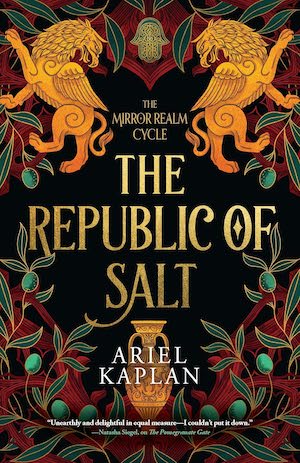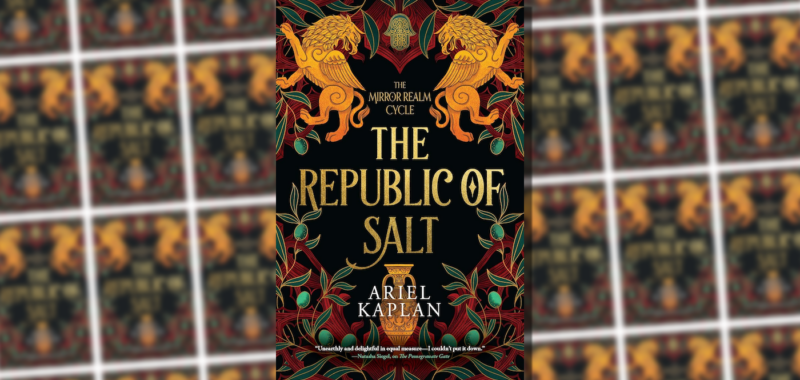Ariel Kaplan’s The Republic of Salt is the second book in the Mirror Realm cycle, after last year’s The Pomegranate Gate. Written with an eye for the mythic, a set of characters who have the virtues of their flaws, and a deft hand with a turn of phrase, The Republic of Salt is a worthy successor to The Pomegranate Gate. It is, however, very much a second book, and will make scant sense without having read the first: I myself should have been glad had it included a helpful summary to remind me of what had previously taken place, for in the intervening year I had forgotten several details—and Kaplan’s novels here are full to the brim with details—that meant it took a while for me to catch up.
The mortal realm and the realm of the immortal Maziks are separate but connected. Monthly, at the full moon, gates open between the realms and it is possible to pass through. The realms, too, are connected by the Mirror, which means that events and people in one are frequently affected by events and people in the other. Even when Tarses b’Shemhazai, the Caçador of Rimon in the Mazik realm, is not manipulating events in both worlds to serve his own purpose.
The part-Mazik Naftaly, unsuccessful son of a tailor, went through one such gate in the aftermath of the expulsion of the Jewish people from mortal Sepharad, accompanied by a nameless old woman who had taken him under her wing, and Elena, a clever, cunning, and somewhat amoral grandmother in search of her missing granddaughter.
That granddaughter is Toba, who had also slipped accidentally through a gate to Mazik Rimon, where she fell in with the scholar Asmel and his nephew Barsilay. There, Toba learned that she was half-Mazik, the daughter of Tarses, and that she had a sister, Tsifra, bound in Tarses’ services by his knowledge of her true name. She learns, too, that she has inherited a part in a story that goes back a long time, even for Maziks, in a struggle about kingship, power, control, and the link between worlds that goes back to the kingdom of Luz and its gate, which was torn from the firmament and hidden in a book. The waters of the firmament rushed in, drowning Luz and creating the Dimah Sea, which is still rising: the power of Luz’s kingship was lost, too.
Barsilay is the heir of Luz. Tarses wants him dead, or enslaved. Tarses wants the book that Naftaly once had in his possession. Tarses wants Toba under his power, too. At the end of The Pomegranate Gate, Elena, Naftaly, Toba, the old woman, Barsilay and Asmel were united after danger and great suffering—and immediately split apart in the course of their plan to escape and then, somehow, restore the gate of Luz. The Republic of Salt sees them journeying to reunite, in the company of new allies and old adversaries, learning more about their world and running right from the frying pan into the fire: straight to Mazik Zayit, ruled by a Council of Ten and an elected Prince. It is a wealthy city, famous for its import of salt—fatal poison to Maziks—from the mortal world. Tarses means to conquer it. But few of Tarses’ servants are loyal to him without compunction: The demon Atalef, Toba’s sister Tsifra, and Tarses’ most dangerous assassin, the Peregrine, all have their own agendas. Tarses knows their names, so they cannot disobey his explicit orders, but they will bend the letter of those orders in order to achieve freedom, and Tarses’ death. Unless, that is, they decide their paths are better served with Tarses: There are a great number of moving parts and moving plots, here, and perhaps even more moving allegiances.
Buy the Book


The Republic of Salt
The narrative is told from the point of view of Toba, her sister Tsifra, Naftaly, Elena, and the nameless old woman. Toba—Toba Bet, she calls herself at first—is a magical copy of the original Toba: She remembers her original self’s death, and is haunted by it. First in the company of an Asmel who is slowly losing his memories, and then in the company of Tsifra—the sister who tortured Barsilay and cut off his arm, who would have delivered Toba to Tarses—she has a roadtrip across Rimon to Zayit, being part of bargains with demons and learning from dead men in her dreams. Naftaly and his lover Barsilay have not quite as uncomfortable a journey, along with Elena and the old woman, but once they arrive in Zayit their troubles truly begin. Naftaly dreams true dreams, and along with information they have picked up along the way that means he knows the invasion of Zayit is imminent. But his dreams are dangerous to his health. Meanwhile, Barsilay might be heir to Luz, but he has no desire to become a king, though their ultimate safety and that of the world might rely on his ascension. He would much rather worry about his boyfriend. And Elena wants her granddaughter safe, but when she’s separated from the others and stumbles across an ancient Mazik who values her intellect, she is distracted into research—research that produces a deadly poison.
Like The Pomegranate Gate before it, The Republic of Salt is a novel that draws from the well of Jewish history and Jewish mysticism, with echoes from the wisdom literature of the Second Temple and the mysticism of medieval Egypt and Sephardic Spain. But it is a novel and a world suffused with Jewish influences, quite apart from the characters themselves and their relationships with religion and ethnicity.
It is also, to one degree or another, a novel concerned with being out of place, with exile and inheritance, with diaspora and relationships to power, with the nature of loyalty and the nature of identity. Are you the sum of your choices and your memories, and what do those choices, those memories, make you? When is it selfish to refuse power, and when to claim it? The Republic of Salt is a series of arguments—grounded, always, in Kaplan’s very relatable characters and their journeys—about what it means to be a person in a world full of fraught and complicated choices, torn loyalties, and difficult responsibilities. It also concerns itself with what it means to live with, and try to ameliorate, the choices of one’s predecessors—choices that led to an ongoing slow disaster. (Is the rising Dimah Sea a metaphor for climate change? If so, it’s the bluntest metaphor in the entire story.)
This is a fascinating, complex story, measured in its pacing, deft and lucid in its language, compelling in its characters. I enjoyed it, and I look forward eagerly to the climax of the trilogy.
The Republic of Salt is published by Erewhon Books.

